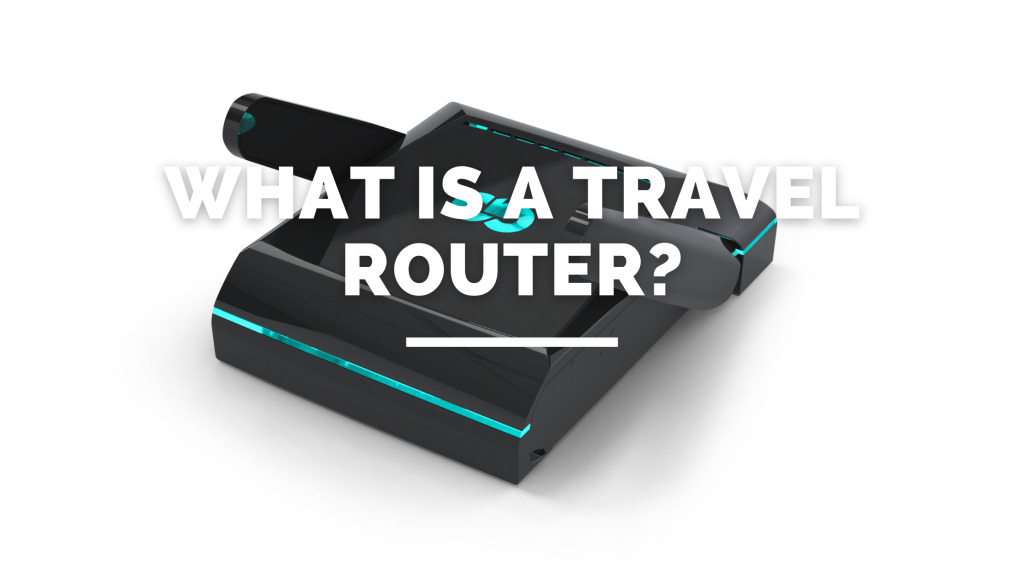What Is A Travel Router?

If you’ve been around any sort of travel tech recently you may have heard the term “Travel Router”. But what are travel routers, and more importantly what do they do and why would you want to own one?
What Are Travel Routers?
A router is a device that routes or determines where or how to send internet traffic. A travel router is a travel oriented version of this type of device. The goal of a travel router is to create a private network of only your devices within a larger public or semi-private WiFi system, like a hotel, Airbnb, airport or co-working location.
Travel routers are also extremely useful for RVs. Their compact size and ability to handle different locations where you may need to connect is highly useful.
What Do Travel Routers Do?
Travel Routers create your own personal private network when traveling or on the go. Travel Routers are generally small (about the size of your hand). The value of having your own private network are two fold. First, lets you take your own devices such as phones, tablets, laptops, streaming sticks, smart speaker and even smart assistants with you when traveling without needing to setup each device separately for the internet or WiFi at a hotel, Airbnb, RV park or other location. You simply connect the travel router to the network at that location and then all of your devices you brought with you are on that connection.
The other benefit is security. Travel routers essentially create your own personal private network out of the public network you access when traveling. Think of it like your own private room at a restaurant. You’ll still in the restaurant, eating the same food, but people generally can’t see what you are doing or hear your conversation. While travel routers along don’t guarantee complete security, they certainly make you a much more difficult target. If you are interested in learning more, check out our article on how travel routers help secure public WiFi.
Gets Devices Past Those Screens When You First Connect
Anyone who has used WiFi at hotels, airports, coworking location, coffee shops or other travel location has had a screen that popups asking you to login or enter more information. These are known as captive portals. The challenge is many devices, including most streaming sticks, smart speakers or gaming systems typically can not get online when there is a captive portal.
With a travel router you will never need to worry about whether you can get any of the devices you bring with you connected – it just works.
They Allow Smart Devices To Work On Travel WiFi
If you’ve every considered bringing a smart devices with you when traveling or in your RV, such as a Sonos, Homepod, Chromecast, Smart Assistant and many others you may be surprised to learn they don’t work on many travel WiFi connections. For security reasons most hotel, RV park, coffee shop and airport WiFi connections don’t let different devices on the same connection talk to each other.
Even when they do work, you often have to do a complete factory reset in order to reconfigure them for the hotel or Airbnb WiFi connection. That’s a lot of effort. You also may go through all of that effort just to find out it doesn’t work a all because of the security settings of the WiFi connection.
Since travel routers create their own private WiFi network that your devices are already connected to, you don’t need to reconfigure them with each change in location. Plus, even if the hotel or Airbnb’s WiFi connection doesn’t allow different devices to talk to each other you won’t have a problem because you’ll have your own private network. With a travel router, you’re good to go.
What Else Should I Know About Travel Routers?
There are a number of known shortcomings to a lot of travel router products. But don’t let that stop you from considering one. Generally speaking, most devices calling themselves a “travel router” will have the same basic core function: create a private WiFi network out of an existing network. Beyond that, there are a lot of variations.
Many of the user interfaces can be very technical and difficult to use. The user interfaces for travel routers are getting easier and more intelligent. Just be sure to pick the right product and make sure to research not just the capabilities, but whether the experience of using it fits with what you are looking for.
Another consideration is that, for most travel routers, they are only as good as what they connect to. While some travel routers have the capability to optimize (enhance) and boost performance, most travel routers can’t. Most regular travelers know just how poor and unreliable most travel WiFi connections can be. A solution often is to buy a cellular hotspot rather than using the available free or public WIFi.
How Are Travel Routers Different From Hotspots?
Travel routers and cellular hotspots are different in a key way. While travel routers create a private WiFi network out of a public internet connection, cellular hotspots create a private WiFi network out of a cellular connection. Generally speaking, cellular hotspots are not designed to work with public WiFi as well, only the cellular network.
Also there are some travel routers that can also support a cellular card for added benefits. There are also some cellular hotspots that can also connect and use other public internet, usually as a secondary choice when cell signal is poor or to provide an option to limit your data consumption. These may even be referred to by a different name.
